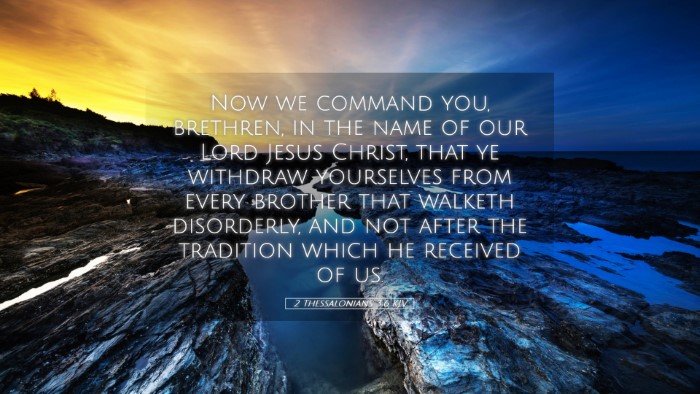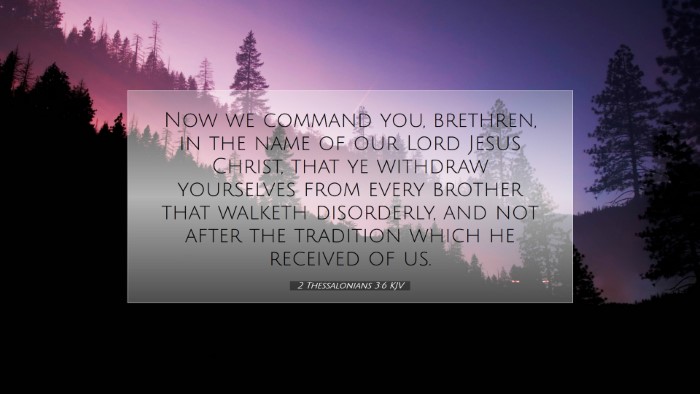Commentary on 2 Thessalonians 3:6
Verse: "Now we command you, brethren, in the name of our Lord Jesus Christ, that you withdraw yourselves from every brother that walks disorderly, and not after the tradition which he received of us."
Introduction
The Apostle Paul, in this epistle to the Thessalonians, addresses serious issues concerning church discipline, community conduct, and the importance of adhering to sound doctrine. This verse stands as a strong exhortation to the church, urging them to maintain purity and order within their fellowship. Paul’s directives here serve as a vital principle for the church in every generation, emphasizing the need for careful discernment among believers.
Exegesis and Analysis
This verse can be dissected to reveal several key themes:
- Command in Authority:
Paul opens with a command issued in the authority of Christ. This demonstrates that his instruction holds significant weight and should be taken seriously. This divine backing underscores the importance of his message.
- Community and Separation:
The exhortation to "withdraw yourselves" speaks to the theme of community integrity. Paul stresses that relationships within the church must reflect a commitment to Christ’s teachings. Disengagement from those who do not adhere to this is vital for maintaining the health of the ecclesia.
- Identifying Disorderly Conduct:
Paul identifies those who "walks disorderly" as a primary concern. The term "disorderly" implies a breach of the established norms and traditions laid out by the apostles. This behavior could disrupt the unity and moral fabric of the church.
Insights from Matthew Henry
Matthew Henry points out that the “command” Paul gives is not merely a directive but stands as a principle reflecting the nature of Christian conduct. He emphasizes that the disorderly are not merely misled but are intentionally ignoring the teachings they have received. By this, Henry suggests that the church has a responsibility to maintain discipline to foster a conducive environment for spiritual growth.
Insights from Albert Barnes
Albert Barnes interprets "withdraw" as a basis for church discipline. He suggests that there is a necessity for the church to take a proactive stance against those who disrupt the peace through their erroneous ways. This is not an act of condemnation but rather a protective measure for the faithful. Barnes posits that such a withdrawal serves not only to protect the church community but also as a wake-up call to the wayward brother.
Insights from Adam Clarke
Adam Clarke brings attention to the concept of “tradition” in this context. He notes that traditions here refer primarily to the teachings and practices given by the apostles, which should guide all believers' conduct. Clarke emphasizes the importance of adherence to these traditions as a means to safeguard against the encroachment of false teachings and to maintain doctrinal purity. He implies that the traditions are not merely cultural but are deeply rooted in the doctrine of Christ and the apostles.
Theological Implications
The instruction provided in this verse encapsulates important theological tenets:
- Holiness and Discipline: The church must pursue holiness, and discipline is an essential part of that pursuit. The health of the community requires that members reflect Christ in their behavior.
- Authority of Scripture: Paul’s admonition serves as a reminder of the authority derived from being in Christ, reinforcing the necessity of believers to align with the teachings of Scripture.
- Responsibility of Believers: Each member of the congregation holds a collective responsibility to maintain harmony and integrity within the church body. This calls for vigilance and an active role in preserving biblical standards of conduct.
Practical Applications
From this exhortation, there are several practical applications for modern believers:
- Engagement in Church Community: Believers must actively participate in their church community while remaining discerning about the practices and behaviors of their fellow members.
- Upholding Truth: It is imperative for the church to uphold the teachings of Scripture against influences that may lead to moral or doctrinal decay.
- Restorative Approach: A balance should be maintained between discipline and restoration. The goal is not to alienate but to bring back the wayward into fellowship with Christ and the church.
Conclusion
2 Thessalonians 3:6 offers a profound call to holiness and accountability within the church. It reflects the necessity of maintaining a community that honors Christ through adherence to sound doctrine and communal discipline. The insights from respected commentaries shed light on the depth of meaning behind Paul's words and their application for contemporary believers. As we resolve to follow these instructions, we affirm our commitment to uphold the integrity of the body of Christ.


